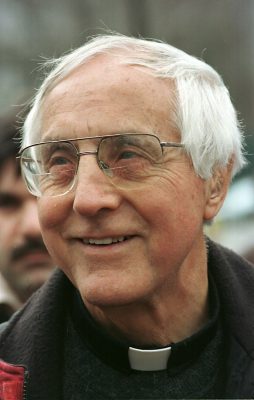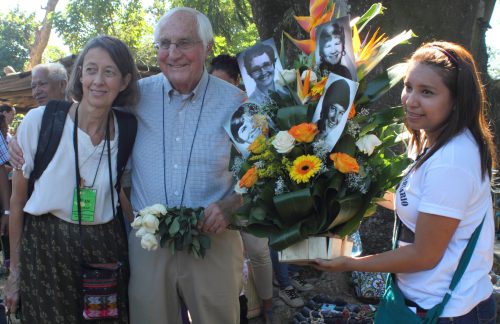By Detroit Catholic | OSV News
Whether it was speaking out against injustice, ministering to those on society’s margins or accompanying communities afflicted by geo-political catastrophes, retired Detroit Auxiliary Bishop Thomas J. Gumbleton traveled great lengths to express his solidarity with people on the periphery of society.
An outspoken champion of social justice causes who traveled far and wide in support of peace efforts, Bishop Gumbleton died April 4 at the age of 94.
“Bishop Gumbleton was a faithful son of the Archdiocese of Detroit, loved and respected by his brother priests and the laity for his integrity and devotion to the people he served,” Detroit Archbishop Allen H. Vigneron said April 4. “We in the Archdiocese join his family and friends in praying for the repose of his soul and asking God to grant him the reward of his labors.”
As of the evening of April 4, funeral arrangements are pending.

Known equally for his frequent trips to nations suffering from economic fallout and wars, his stances against church teaching on topics such as homosexuality and women’s ordination, and his advocacy of peace and anti-racism efforts, Bishop Gumbleton was at times a controversial figure in Catholic circles.
Consecrated a bishop during a time of great social change both in the world and the church, Bishop Gumbleton’s early life and ministry were significantly influenced by the Second Vatican Council, which called upon the laity to take up a greater role in the church, and for the church to take a greater role in speaking out against injustice.
The fifth of nine children of Vincent and Helen (Steintrager) Gumbleton, Thomas Gumbleton was born Jan. 26, 1930, and grew up in Epiphany Parish on Detroit’s west side.
Raised in what he called “a humble working-class Catholic family,” Thomas Gumbleton was one of several in his family who lived to serve the church: Three of his brothers studied in the seminary, three of his aunts were members of the Sisters, Servants of the Immaculate Heart of Mary (IHMs), and one of his first cousins was a priest in the Diocese of Saginaw, Michigan.
“It does seem as though our family has been well blessed with religious vocations, but we never pushed them,” Helen Gumbleton told The Michigan Catholic in 1968 when Father Thomas Gumbleton was named an auxiliary bishop for the Archdiocese of Detroit. “In fact, I learned Tommy was thinking of entering Sacred Heart Seminary from an eighth-grade classmate who told me when I was on volunteer lunch duty at school.”
Thomas Gumbleton eventually enrolled in Sacred Heart in Detroit for high school and college, then transferred to now-closed St. John’s Provincial Seminary in Plymouth, Michigan, to complete his studies.
On June 2, 1956, he was ordained a priest at Detroit’s Cathedral of the Most Blessed Sacrament by Cardinal Edward A. Mooney.
Father Gumbleton served four years as associate pastor of St. Alphonsus Parish in Dearborn, until 1960, when Cardinal John F. Dearden appointed him assistant chancellor of the Archdiocese of Detroit.
In 1964, he was sent to study at the Pontifical Lateran University in Rome, where he received a doctorate in canon law. Upon his return to Detroit, he was promoted to vice chancellor by Cardinal Dearden, and Pope St. Paul VI elevated him to the rank of monsignor. He also took up the role of administrator of Holy Ghost Parish in Detroit in 1967.
Msgr. Gumbleton played an active role in the governance of the archdiocese, serving as the acting director of the archdiocesan Community Affairs Department, chairman of the Building Commission, and leader of the Urban Parish Apostolate and Project Equality, a program initiated by Cardinal Dearden to fight poverty in Detroit.
On March 8, 1968, Pope Paul VI appointed him the 10th auxiliary bishop of Detroit.
“My first reaction to the appointment was disbelief, very honestly. I couldn’t really imagine that I was meant to get that appointment and hadn’t been expecting it,” Bishop Gumbleton told The Michigan Catholic during a press conference at Sacred Heart Seminary following the announcement. “After that, I realized it was the real thing and I was, of course, very pleased that the people would think highly enough of me to recommend me for being a bishop.
“So it takes a great deal of faith and confidence in God to figure that someday you might make some right decision that will enable the church to move into the modern age more fully and more effectively,” Bishop Gumbleton said.
On May 1, 1968, Cardinal Dearden consecrated the 38-year-old Bishop Gumbleton; at the time, he was the youngest bishop in the country.
Cardinal Dearden put him to work right away. The archdiocese was preparing for Synod 69, a gathering of the entire archdiocese that would pave the way for increased lay participation in parish life, such as pastoral councils and lay ministry positions. Leading numerous “Speak Up” sessions in the run-up to the synod, Bishop Gumbleton built a rapport with parishioners as he listened to what people wanted from their church as it sought to implement the reforms of Vatican II.
In addition to advocating for the change within the church, Bishop Gumbleton called for change in the world.
Among the most prominent Catholic leaders to speak out against the Vietnam War, Bishop Gumbleton in 1972 became the founding president of Pax Christi USA, an American Catholic peace movement that calls for non-violence and the abolishment of nuclear weapons. He also served from 1976 to 1984 as president of Bread for the World, a Christian advocacy organization that addresses public policy related to ending hunger worldwide.
In 1983, Bishop Gumbleton co-authored a document for the United States Catholic Bishops Conference titled “The Challenge of Peace,” detailing the Catholic social justice movement’s commitment to peace.
During his episcopate, Bishop Gumbleton traveled the world, speaking out against wars and meeting victims of violence in Iraq, Afghanistan, Vietnam, El Salvador, Nicaragua, Guatemala, Israel, Palestine, Colombia, Haiti and Peru.
“I suppose the one that in some ways was most significant was in El Salvador when they finally signed the peace agreement in 1992,” Bishop Gumbleton told The Michigan Catholic in 2016 during his 60th episcopal jubilee. “All of those areas are places where the problems were never totally solved, but you could see some improvement in the lives of people.”
Bishop Gumbleton was arrested multiple times while participating in anti-war protests, such as in 1999, when he and 25 others were detained outside the White House while demonstrating against the NATO bombing campaign in Serbia, and in 2003 while demonstrating against the Iraq War.
For his lifelong effort promoting peace and harmony, Bishop Gumbleton received the 2007 Detroit Spirit of Martin Luther King Jr. Award, in addition to several other honors from universities and nonprofits.
Perhaps one of the most dramatic examples of Bishop Gumbleton’s accompaniment came in 1979, when he was one of three American clergy members to travel to Tehran, Iran, to celebrate Christmas with hostages at the American embassy.
After the Iranian Revolution of 1979, Iranian students stormed the American embassy and took 52 Americans hostage. Bishop Gumbleton was offered the chance to celebrate an ecumenical service on Christmas Eve. He was escorted by the Iranian Revolutionary Guard, where he was able to celebrate Mass with two small groups in an office of the American embassy.
“I had an opportunity to go to each one individually, shake hands or embrace, and that was a good exchange for a few words,” Bishop Gumbleton told The Catholic Worker in 1980. “In each case, they just said they couldn’t thank me enough for coming — how much it meant to them.”
Bishop Gumbleton later added that his celebration of Mass amidst one of the tensest diplomatic crises in American history was an experience he’d always remember.
“I’ve noticed since … that every time I say Mass now, at some point in the Mass I have a very good recollection of that Mass in the embassy and that Christmas Eve,” Bishop Gumbleton told The Catholic Worker. “And it just makes me feel very close to those hostages with whom I celebrated that Mass.”
Bishop Gumbleton never lost his outspoken streak.
A regular columnist for the National Catholic Reporter, Bishop Gumbleton regularly dissented from mainstream Catholic thought and at times publicly clashed with his fellow bishops.
As the sexual abuse crisis was unfolding in the church in the early 2000s, and after his participation in the USCCB’s 2002 June meeting in Dallas, Bishop Gumbleton made controversial comments suggesting church leadership was taking a lax approach to the scandals, even as the bishops’ developed the Charter for the Protection of Children and Young People, which laid out norms for dealing with sexual abuse in a comprehensive way.
Bishop Gumbleton, who decades earlier had processed complaints of clerical sexual abuse as a chancery official, said at the time, “It’s not over and it won’t be over until we within the church deal with it in a very open, honest and thorough way. And that’s going to take much change within the church.”
In 2006, Bishop Gumbleton told a news conference in Columbus, Ohio, he had been sexually abused as a teenage seminarian some 60 years earlier. He did not name the priest and described his abuse at Sacred Heart Seminary High School as “minor” compared with what many other victims had suffered.
As reported in The Michigan Catholic, the Archdiocese of Detroit said it was saddened, for the bishop’s sake, to learn of his experience. The archdiocese noted that it was never made aware of the alleged abuse. And, subsequent to Bishop Gumbleton’s surprise revelation, no complaint was filed with local law enforcement or with the archdiocese.
Bishop Gumbleton was at times the flashpoint of controversy, critiquing the Catholic Church’s ministry to the LGBTQ community, as well as its handling of those who suffered from clerical abuse.
He publicly contradicted his fellow bishops regarding the church’s teaching on same-sex marriage, the ordination of women to the priesthood and the reception of Communion by those in same-sex relationships.
After surpassing the age of 75, when bishops are required to tender their resignation to the pope, Bishop Gumbleton retired from active episcopal duties in 2006, one year after tendering his resignation to the pope at age 75, as is required by bishops.
However, Bishop Gumbleton was asked to continue as administrator of St. Leo Parish in Detroit, where he had served as pastor since 1983, for another year. Even after his tenure at St. Leo ended, and the parish merged with St. Cecilia to form St. Charles Lwanga Parish, Bishop Gumbleton stayed in residence at the St. Leo rectory for a time and maintained a presence in the city.
Detroit Catholic is the news outlet for the Archdiocese of Detroit.
Pictured above: Jean Stokan, director of the Justice Team for the Sisters of Mercy, and retired Auxiliary Bishop Thomas J. Gumbleton of Detroit pose for a photo during a Dec. 2, 2015, memorial service to commemorate the 35th anniversary of the murder of four U.S. churchwomen in Santiago Nonualco, El Salvador. (OSV News photo/Edgardo Ayala, CNS file)






















